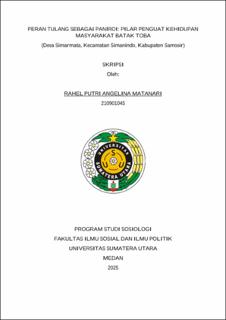Peran Tulang Sebagai Paniroi: Pilar Penguat Kehidupan Masyarakat Batak Toba (Desa Simarmata, Kecamatan Simanindo, Kabupaten Samosir)
The Role of Tulang as Paniroi: A Pillar Strengthening the Life of the Toba Batak Community (Simarmata Village, Simanindo District, Samosir Regency)

Date
2025Author
Matanari, Rahel Putri Angelina
Advisor(s)
Munthe, Hadriana Marhaeni
Metadata
Show full item recordAbstract
This study explores the role of Tulang (maternal uncle), a key figure in the Dalihan Na Tolu
kinship system of the Batak Toba community, specifically in Simarmata Village, Samosir
Regency. Using a descriptive qualitative approach and Michel Foucault’s theory of power
relations, this research investigates how power operates through social relations—non-
dominative but productive and diffused. As Paniroi, Tulang holds responsibilities beyond ritual
participation in weddings, funerals, and inheritance distribution; he also serves as an advisor,
mediator, moral guardian, and social harmonizer within the community. In the context of social relations, Tulang engages actively with other traditional figures such as Raja parhata in a complementary and mutually reinforcing relationship. This interaction is built on mutual respect, trust, and recognition of Tulang’s deep knowledge of paradaton (customary law). His authority stems not from formal power but from his cultural wisdom and social maturity. As a cultural symbol, Tulang bridges generations and preserves traditional values through oral and lived transmission. The findings reveal that Tulang’s power as Paniroi operates culturally, through the collective internalization of norms and customary values. Amidst modernization and shifting cultural perspectives, the role of Tulang remains crucial as a cultural anchor who safeguards both tradition and social cohesion. Therefore, Paniroi is not merely a ritual leader, but a social actor who sustains community identity and solidarity across generations.
Collections
- Undergraduate Theses [1042]
